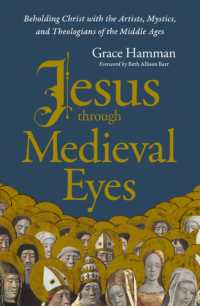Full Description
This thoroughly revised update to the first edition highlights cutting edge research on the effectiveness of various humanistic psychotherapy approaches. Illustrative case examples containing vivid client amp ndash therapist dialogue demonstrate how to apply humanistic principles in practice.
Humanistic psychotherapy is based on more than 7 years of psychological research, but there has been a surge of literature since the first edition of Humanistic Psychotherapies. This extensively updated volume highlights the flourishing evidence base for humanistic approaches, demonstrating that they are equal to or more effective than other therapeutic approaches. In fact, cornerstones of humanistic practice, such as therapist empathy and authentic emotional expression and experience, are essential to promoting positive client outcomes for non-humanistic practitioners as well.
In addition to a general review of research, the contributors focus on specific approaches, including
person-centered therapy,
gestalt therapy,
focusing-oriented therapy,
existential therapy,
emotion-focused therapy,
relationship enhancement therapy, and
child-centered play therapy.
Also discussed are important therapist factors and client variables that contribute to effective psychotherapy.
New findings are translated into practical guidelines for clinicians. Numerous case examples with vivid client amp ndash therapist dialogues illustrate how humanistic principles and approaches can be applied in actual practice-not just with individuals, but also with couples, families, and children. The final chapter synthesizes the entire volume with a proposed model for optimal humanistic psychotherapeutic practice, based on 2 simple premises drawn from the best evidence available.
Contents
Contributors
Preface
Acknowledgments
Introduction
David J. Cain, Kevin Keenan, and Shawn Rubin
I. Historical and Conceptual Foundations
Psychological Foundations for Humanistic Psychotherapeutic Practice
Mick Cooper and Stephen Joseph
II. Overviews of Research
Effective Humanistic Psychotherapy Processes and Their Outcomes
Michael J. Lambert, Louise G. Fidalgo, and Madeline R. Greaves
Qualitative Research and Humanistic Psychotherapy
Heidi M. Levitt
The Role of Empathy in Psychotherapy: Theory, Research, and Practice
Jeanne C. Watson
Emotion in Psychotherapy: An Experiential amp ndash Humanistic Perspective
Antonio Pascual-Leone, Sandra Paivio, and Shawn Harrington
III. Major Therapeutic Approaches
Person-Centered Therapy: Past, Present, and Future Orientations
David Murphy and Stephen Joseph
Contemporary Gestalt Therapy
Philip Brownell
Focusing-Oriented amp ndash Experiential Psychotherapy: From Research to Practice
Kevin C. Krycka and Akira Ikemi
Existential Psychotherapies
Meghan Craig, Jo amp euml l Vos, Mick Cooper, and Edgar A. Correia
Emotion-Focused Therapy
Rhonda N. Goldman
IV. Therapeutic Modalities
Empirically Supported Humanistic Approaches to Working With Couples and Families
Catalina Woldarsky Meneses and Robert F. Scuka
Humanistic Psychotherapy With Children
Dee C. Ray and Kimberly M. Jayne
V. Therapeutic Issues and Applications
The Good Therapist: Evidence Regarding the Therapist's Contribution to Psychotherapy
Kevin Keenan and Shawn Rubin
Client Variables and Psychotherapy Outcomes
David M. Gonzalez
VI. Analysis and Synthesis
Toward a Research-Based Integration of Optimal Practices of Humanistic Psychotherapies
David J. Cain
Index
About the Editors








